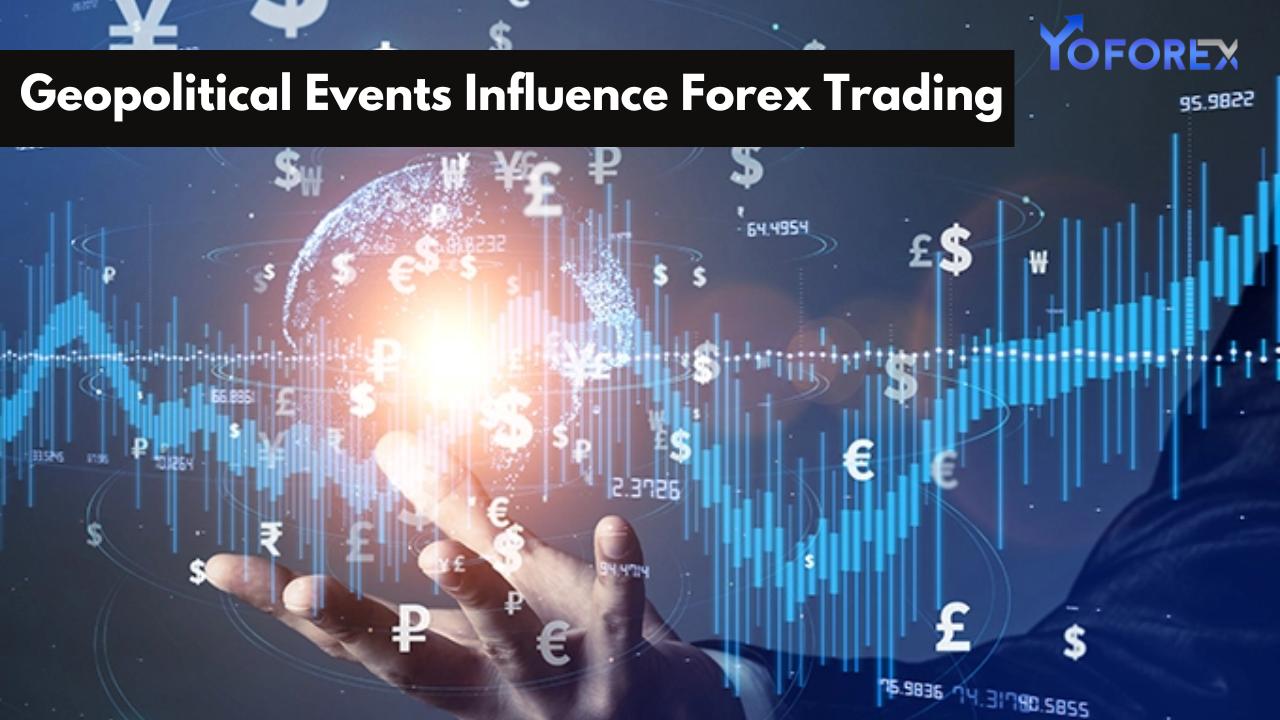The foreign exchange (forex) market is one of the most dynamic financial markets in the world, where currencies are traded 24/7. While technical analysis and market trends often guide trading decisions, geopolitical events also play a significant role in shaping currency movements. Understanding how these events impact forex trading is crucial for making informed decisions and managing risks effectively.
What Are Geopolitical Events?
Geopolitical events are occurrences or developments in international politics, economics, or social systems that can have widespread implications on global financial markets. Examples include:
- Political elections and leadership changes.
- Trade disputes and tariffs.
- Wars, conflicts, or terrorist activities.
- Economic sanctions or embargoes.
- Natural disasters with political implications.
- International agreements or breakdowns.
These events influence investor confidence, market sentiment, and ultimately, the value of currencies.

Key Ways Geopolitical Events Impact Forex Markets
1. Currency Volatility
Geopolitical events often introduce uncertainty into the market, leading to increased currency volatility. Traders react to events by adjusting their positions, which can cause significant price fluctuations.
Example:
- The announcement of Brexit in 2016 caused the British pound (GBP) to experience sharp declines due to uncertainty about the UK’s economic future outside the EU.
How Traders Respond:
- Monitor economic calendars for potential geopolitical disruptions.
- Use stop-loss orders to mitigate losses during volatile periods.
2. Safe-Haven Currencies
During periods of geopolitical uncertainty, investors often flock to “safe-haven” currencies that are perceived as stable and less risky.
Examples of Safe-Haven Currencies:
- US Dollar (USD): Widely considered a global reserve currency.
- Japanese Yen (JPY): Historically stable during global crises.
- Swiss Franc (CHF): Known for its neutrality and strong banking system.
Example:
- During the 2022 Russia-Ukraine conflict, the Japanese yen and Swiss franc appreciated as investors sought safe assets.
Trading Tip:
- Keep an eye on geopolitical tensions to identify opportunities in safe-haven currencies.
3. Central Bank Policies
Geopolitical events can influence central bank decisions on interest rates, monetary policy, and currency intervention.
Example:
- Trade tensions between the US and China led the Federal Reserve to adopt a more dovish stance, cutting interest rates to support economic growth. This impacted the value of the US dollar against other currencies.
How Traders Respond:
- Analyze central bank statements and minutes for insights into policy changes driven by geopolitical developments.
4. Trade Wars and Tariffs
Trade disputes between major economies can disrupt global supply chains and economic growth, influencing currency values.
Example:
- The US-China trade war resulted in fluctuations in the Chinese yuan (CNY) and US dollar (USD) as traders assessed the impact of tariffs on both economies.
Trading Tip:
- Follow updates on trade negotiations and tariff announcements to predict currency movements.
5. Economic Sanctions
Sanctions imposed by one country on another can weaken the target country’s currency while strengthening the imposing country’s currency.
Example:
- Sanctions on Russia led to a significant devaluation of the Russian ruble (RUB) as foreign investment and trade were restricted.
How Traders Respond:
- Avoid trading heavily sanctioned currencies due to liquidity risks.
- Look for opportunities in the currencies of countries imposing the sanctions.
6. Elections and Political Uncertainty
Elections and political instability often result in heightened market volatility as traders speculate on potential policy changes.
Example:
- The 2020 US presidential election caused fluctuations in the US dollar due to differing economic policies proposed by the candidates.
Trading Tip:
- Monitor pre-election polls and post-election policy announcements to anticipate currency movements.
7. Wars and Military Conflicts
Military conflicts disrupt global trade, cause commodity price fluctuations, and lead to shifts in investor sentiment, all of which impact forex markets.
Example:
- The Gulf War in the early 1990s caused significant volatility in oil-exporting countries’ currencies due to changes in crude oil prices.
How Traders Respond:
- Diversify portfolios to reduce exposure to affected currencies.
- Monitor commodity prices like oil and gold for indirect impacts on forex markets.
8. Natural Disasters
Natural disasters with geopolitical implications can influence currency values, particularly for countries reliant on specific industries.
Example:
- The 2011 earthquake and tsunami in Japan led to a temporary appreciation of the Japanese yen as investors anticipated repatriation of funds for rebuilding efforts.
Trading Tip:
- Track natural disasters and their economic implications, especially for countries with vulnerable economies.
Strategies for Forex Traders During Geopolitical Events
1. Stay Informed
- Use economic calendars, news platforms, and geopolitical analysis to stay updated on current events.
- Follow key global institutions like the IMF, World Bank, and UN for insights.
2. Risk Management
- Implement stop-loss and take-profit orders to limit exposure during volatile periods.
- Reduce leverage to avoid large losses from sudden price swings.
3. Diversify Your Portfolio
- Trade multiple currency pairs to spread risk across different markets.
- Include safe-haven assets and commodities like gold in your portfolio.
4. Focus on Technical and Fundamental Analysis
- Combine geopolitical insights with technical indicators like moving averages and RSI.
- Use fundamental analysis to evaluate the broader economic impact of geopolitical events.
5. Short-Term Trading Opportunities
- Capitalize on short-term trends triggered by breaking news.
- Use scalping or day trading strategies to take advantage of quick price movements.
Challenges of Trading During Geopolitical Events
- Unpredictability:
- Geopolitical events can unfold rapidly and unexpectedly, making it difficult to anticipate market reactions.
- Increased Volatility:
- While volatility offers opportunities, it also increases risk, especially for leveraged positions.
- Limited Historical Data:
- Unique geopolitical events may not have clear historical precedents to guide trading decisions.
Conclusion
Geopolitical events are a powerful force in forex markets, shaping currency values through changes in investor sentiment, trade policies, and economic stability. For forex traders, understanding the interplay between global events and currency movements is essential for navigating these challenges and capitalizing on opportunities. By staying informed, managing risk, and leveraging both technical and fundamental analysis, traders can make more confident decisions in an ever-changing geopolitical landscape.

